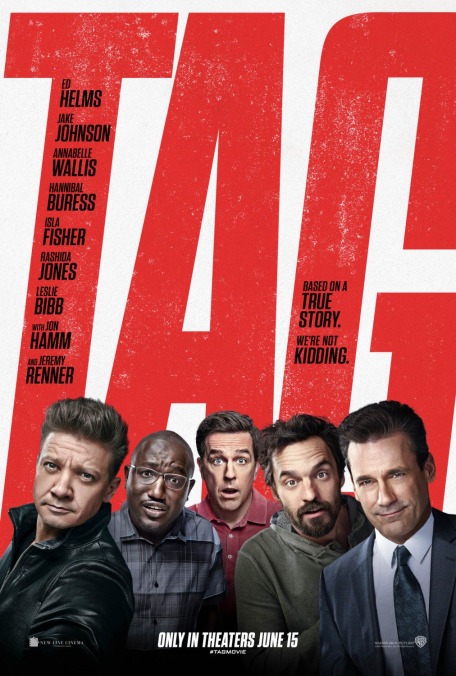Tag turns male friendship into a petty, elaborate, sometimes amusing game

Most comedies about men stubbornly refusing to act their age are actually stealth lectures: Fun is fun, they’ll grant, before going on to insist that sorry, you really do have to grow up eventually. Tag begs to differ. This is a comedy that says you never have to totally grow up, so long as you occasionally, literally behave like a child. Directed by TV veteran Jeff Tomsic from a script by Rob McKittrick and Mark Steilen, the film follows a group of fortysomething friends who have been playing the same schoolyard game for 30 years, spending most of every May tagging or avoiding being tagged by each other. “Grown men take a month off every year to play a children’s game?” someone incredulously asks. But as Tag lets its middle-aged characters constantly explain, their annual regression ritual serves a greater purpose: “It keeps us in each other’s lives!”
If this seems like an exceptionally stupid way to keep in touch, and maybe a pretty stupid idea for a movie, too, know that it’s also, naturally, a true story. Liberties have been taken, of course, which is clear from the closing-credits footage of the real people, none possessed of Jon Hamm’s chiseled jawline or, presumably, Hannibal Buress’ quick wit. In Tag, it’s five instead of nine friends who drop everything one month a year to jet around the country, donning elaborate disguises, ambushing each other at every hour of the day or night, all in an ongoing attempt not to be “it.” The measures get pretty extreme: We watch, in the opening scene, as practicing dentist Hoagie (Ed Helms) procures a part-time janitorial job at a Fortune 800 corporation—his brilliant strategy for getting the drop on his clean-cut pal, Callahan (Hamm), who runs the company.
Hoagie, as it turns out, isn’t even the most obsessively competitive of the bunch. That honor belongs to fitness guru Jerry (Jeremy Renner, rocking CGI arms, though the effect is imperceptible), who in three decades has, improbably, never been tagged. Jerry takes the game so seriously that he hasn’t invited his childhood companions to his upcoming nuptials—he can’t risk them tagging him at the altar! With the champ threatening to retire undefeated, Hoagie rounds up Callahan, stoner divorcé Randy (Jake Johnson), and laidback quipster Sable (Buress) to crash the wedding; along for the ride is a journalist (Annabelle Wallis) whose story on Hamm’s CEO morphs into a human-interest piece about the game, granting the film a voice of reason, an audience surrogate, and a passive observer at which the guys can spout anecdotes and exposition.
Most of the best jokes in Tag concern just how far these knuckleheads are willing to take their lifelong competition. Jerry, it’s revealed, is a kind of ninja mastermind savant: His close calls unfold like the heightened, slow-motion sensory interludes of Guy Ritchie’s Sherlock Holmes, his almost superhuman reflexes and perceptiveness helping him dodge every advance. He’s also serial-killer psychotic in his preparation, stocking his suburban lair with maps of the city and bottles of chloroform. Not that the rest of the friends are much less intense. One early montage shows them exploiting funerals, childbirth, even a fledgling sexual experience for a chance to pass “it” on. Where do women fit into this Olympics of eternal boyhood? Mostly, they’re relegated to the sidelines—the rules of the game were set when “no girls allowed” was standard adolescent protocol—though Tag at least clears the low bar of dudes-behaving-badly comedies by making its female characters co-conspirators and good sports, not wet blankets: Isla Fisher delivers her most unhinged comic performance since Wedding Crashers as Hoagie’s fiercely in-it-to-win-it wife, Anna, while the bride to be (Leslie Bibb) ultimately proves more than just tolerant of the shenanigans constantly threatening to tilt her wedding into slapstick mayhem.
So how do these dudes afford to essentially wage a month-long, multi-state prank war every year? Has it cost them jobs, relationships, the other friendships they might have made post-puberty? Are Jon Hamm and Hannibal Buress really supposed to be roughly the same age? These are not questions conducive to enjoying Tag’s men-will-be-boys tomfoolery. For all the comic mileage it gets out of the guys’ borderline sociopathic commitment to their group activity, the film is also aggressively sentimental about what it means to them, offering no less than half-a-dozen variations on its insistence that tag has kept them together. There’s something mildly depressing about viewing petty gamesmanship as the engine that fuels and sustains male friendship. But funny is funny, and Tag gets by, appropriately enough, on the personalities of its stars: Hamm playing his alpha over-confidence to a hilt, Johnson tweaking his signature slacker shtick, Helms giving nerd rage another enthusiastic workout. But in this affectionate pissing contest, it’s Buress’ running, nonchalant commentary—the sense that he’s riffing on the movie from within it—that scores some of the biggest laughs. If bromantic ensemble comedy is a competition, he edges out a win with every offbeat punchline.